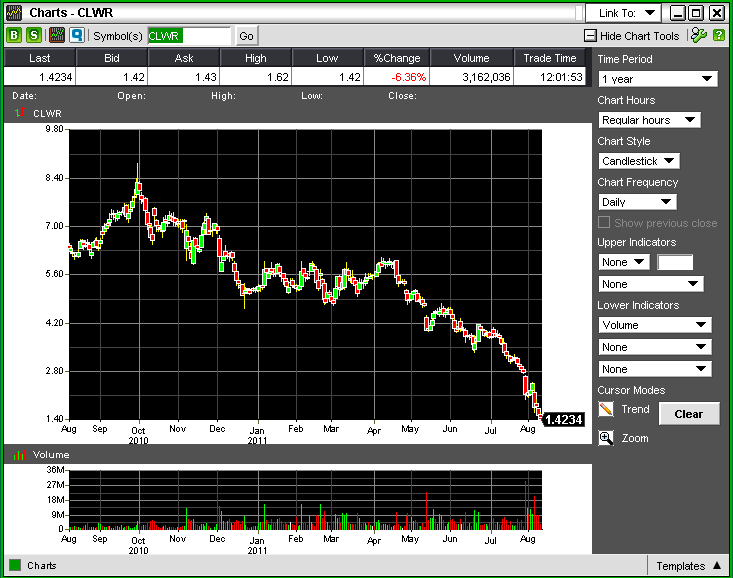Clearwire: Doubts about survival emerge; Shares to 50 cents?

Clearwire is facing concerns about its prospects as a going concern and one analyst thinks shares are headed to 50 cents.
Last week, Clearwire said it needed more capital to the tune of $900 million to complete its WiMax network ($300 million) and roll out an LTE version ($600 million). Toss in that necessary capital to $4 billion in debt already and Clearwire has some serious issues.
Bank of America Merrill Lynch analyst Michael Funk gave Clearwire stock a 50 cent target and said the company’s survival is at stake. The upshot from Funk, via Forbes' Eric Savitz, is that Clearwire won't be able to add customers fast enough and can't easily raise more capital. Sprint was expected to be Clearwire's sugar daddy, but a deal with LightSpeed changes that equation.
In other words, Clearwire isn't in Sprint's network vision going forward and can't alleviate its cash crunch. CNET News noted in May that Clearwire's prospects were a mess. Three months later the picture may become worse.
Clearwire last week reported the following second quarter metrics:
- Revenue of $322.6 million, or $293.7 million on a pro forma basis.
- A net loss from continuing operations of $949.7 million. And a net loss attributed to Clearwire of $168.7 million.
- 7.65 million subscribers.
- A projected 10 million subscribers by the end of 2011.
- And long term debt of $4 billion.
That's some tough math for Clearwire. Some analysts such as Jennifer Fritzsche noted that Clearwire's second quarter cash burn improved and looked on the bright side. Clearwire may not migrate to LTE without funding and has time since it's still a key partner for Sprint. "We believe Clearwire has more time than most realize," said Fritzsche.
Obviously, the market and Funk disagree.
My take on the Clearwire prospects goes something like this:
- Clearwire will have to float more equity to raise capital. That dilution may be why Clearwire gets to 50 cents.
- Sprint can't let Clearwire go bankrupt because the wholesale network provider is the 4G strategy right now.
- Clearwire has some time because this LightSquared deal with Sprint has more than a few uncertainties. The biggest one is GPS interference. John Stanton, Clearwire's interim CEO, took aim at LightSquared last week. Stanton said:
Our strategy going forward will be to provide all carriers in large markets with LTE capacity, where they want it, when they need it. Our LTE strategy is to be the Switzerland of urban 4G LTE capacity, meeting every customer's capacity needs.
I want to distinguish our position from that of a company called LightSquared. As most of you already know, that company is mired in a contentious dispute at the FCC, with the FAA, the Department of Defense, the Department of Transportation, the USNTIA, the GPS industry, and many others over whether its L-band satellite spectrum can safely be used for terrestrial LTE services. The dispute arose after testing ordered by the FCC clearly demonstrated that significant GPS interference would result from their original deployment plans.
We have firsthand experience. As we reported to the FCC during LightSquared's three-site trial in Las Vegas, they knocked one of Clearwire's sites off the air. Lightsquared recently submitted a revised proposal to use only two by ten channel for its network. However, even this proposal faces strong option at the FCC, and no one yet knows what, if any, spectrum will be available for use.
Even if their revised proposal is approved by the FCC, LightSquared would be competing with limited mid-band coverage, not robust high-band capacity. If they get approved for a two times ten megahertz channel, our superior spectrum position will allow us to offer approximately ten times the capacity at each cell site. And if they only get a two by five megahertz channel, we'll have more than 40 times their capacity.
- That capacity and spectrum makes Clearwire valuable. The problem is that Clearwire's assets may be plucked at auction given what looks like an insurmountable long-term debt load. Stanton said Clearwire will be "opportunistic" about raising money and is well financed into 2012.
- Sprint, LightSquared enter 15-year pact for LTE
- Sprint sets 4G plans with LightSquared: WiMax with dash of LTE
